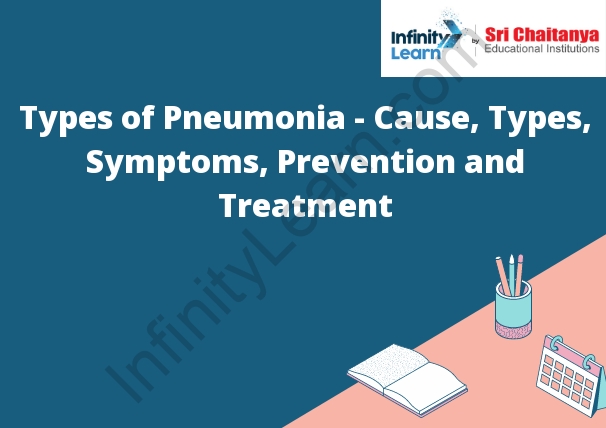Table of Contents
Types of Pneumonia – Causes and Symptoms; Types of Pneumonia
There are many types of pneumonia, most of which are caused by a bacterial or viral infection. The symptoms of pneumonia can vary depending on the type of pneumonia, but typically include coughing, chest pain, shortness of breath, and fever.

How is Pneumonia Caused?
Pneumonia is a lung infection that can be caused by many different types of bacteria, viruses, or fungi. It can also be caused by environmental factors, such as smoke or air pollution. Pneumonia is most commonly caused by Streptococcus pneumoniae, a type of bacteria.
Bacterial Pneumonia
Bacterial pneumonia is a lung infection that is most often caused by Streptococcus pneumoniae, a type of bacteria. Other types of bacteria that can cause pneumonia include Staphylococcus aureus, Haemophilus influenzae, and Mycoplasma pneumoniae.
Viral Pneumonia
Viral pneumonia is a type of pneumonia that is caused by a virus. It is a relatively common illness, and can occur in people of all ages. The most common viruses that cause pneumonia are the respiratory syncytial virus (RSV) and the influenza virus.
Viral pneumonia can cause a wide range of symptoms, depending on the particular virus that is causing the infection. Some people may experience only a mild cold or flu-like illness. Others may develop more serious symptoms, including fever, chest pain, shortness of breath, and rapid breathing.
Viral pneumonia is treated with antibiotics if a bacterial infection is also present. However, most cases of viral pneumonia resolve without treatment. Rest, fluids, and over-the-counter medications such as ibuprofen can help relieve symptoms.
Mycoplasma Pneumonia
e is a type of bacteria that can cause pneumonia, a serious lung infection. It is a common cause of pneumonia in adults, and can also cause pneumonia in children. Mycoplasma pneumoniae is spread through the air, and most people become infected with it by breathing in contaminated air. It can also be spread through close contact with someone who is infected. Symptoms of mycoplasma pneumoniae infection include fever, cough, chest pain, and shortness of breath. Treatment for mycoplasma pneumoniae infection usually includes antibiotics.
Mycoplasma pneumoniae is a type of bacteria that can cause pneumonia, a serious lung infection. It is a common cause of pneumonia in adults, and can also cause pneumonia in children. Mycoplasma pneumoniae is spread through the air, and most people become infected with it by breathing in contaminated air. It can also be spread through close contact with someone who is infected. Symptoms of mycoplasma pneumoniae infection include fever, cough, chest pain, and shortness of breath. Treatment for mycoplasma pneumoniae infection usually includes antibiotics.
Other Pneumonia
Pneumonia is a lung infection that can cause chest pain, coughing, shortness of breath, and fever. Pneumonia is a common illness that affects millions of people each year in the United States. It can occur in people of all ages, but it is most common in older adults and young children.
Pneumonia Symptoms Causes and Prevention
Pneumonia is a serious lung infection that can cause coughing, chest pain, shortness of breath, rapid breathing, sweating, and fever. It is most often caused by bacteria, but it can also be caused by a virus, fungus, or chemical.
Pneumonia can be prevented by getting vaccinated against pneumococcal pneumonia and the flu, washing your hands often, and avoiding close contact with people who are sick.
Pneumonia is treated with antibiotics, antiviral medications, or antifungal medications, depending on the cause. Oxygen therapy and breathing treatments may also be needed.
The Common Symptoms Include the Following:
1. Persistent fatigue
2. Muscle and joint pain
3. Headaches
4. Insomnia
5. Digestive problems
6. Memory and concentration problems
7. Mood swings
8. Sensitivity to light and noise
9. Skin problems
10. Weight gain or loss
Pneumonia Diagnosis
The diagnosis of pneumonia is typically based on symptoms and a physical examination. Imaging tests, such as a chest X-ray, may also be used to help confirm the diagnosis.
Pneumonia Treatment
Pneumonia is a serious lung infection that can be caused by a variety of different organisms, including bacteria, viruses, and fungi. It can be a life-threatening illness, particularly in young children and the elderly. Treatment for pneumonia generally involves antibiotics to kill the offending organism, along with supportive care such as fluids, oxygen, and rest. In some cases, surgery may be necessary to remove the infected tissue.
Types of Pneumonia
Community-acquired pneumonia:
This type of pneumonia is contracted by someone who has not recently been hospitalized or had a significant exposure to antibiotics. It is most often caused by a virus, but can also be caused by bacteria.
Hospital-acquired pneumonia:
This type of pneumonia is contracted by someone who has been recently hospitalized and has had a significant exposure to antibiotics. It is most often caused by a bacteria, but can also be caused by a virus.
Pneumonia caused by aspiration:
This type of pneumonia is caused by inhaling vomit, food, or liquids into the lungs. This can happen when someone is unconscious or has a seizure.








